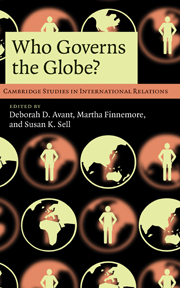Book contents
- Frontmatter
- Contents
- List of figures
- List of tables
- List of contributors
- Preface
- 1 Who governs the globe?
- Part I Authority dynamics and new governors
- Part II Authority dynamics and governance outcomes
- 7 Packing heat: pro-gun groups and the governance of small arms
- 8 Governing the global agenda: “gatekeepers” and “issue adoption” in transnational advocacy networks
- 9 Outsourcing authority: how project contracts transform global governance networks
- 10 When “doing good” does not: the IMF and the Millennium Development Goals
- 11 The power of norms; the norms of power: who governs international electrical and electronic technology?
- 12 “Education for all” and the global governors
- 13 Conclusion: authority, legitimacy, and accountability in global politics
- References
- Index
- Cambridge Studies in International Relations
8 - Governing the global agenda: “gatekeepers” and “issue adoption” in transnational advocacy networks
Published online by Cambridge University Press: 05 June 2012
- Frontmatter
- Contents
- List of figures
- List of tables
- List of contributors
- Preface
- 1 Who governs the globe?
- Part I Authority dynamics and new governors
- Part II Authority dynamics and governance outcomes
- 7 Packing heat: pro-gun groups and the governance of small arms
- 8 Governing the global agenda: “gatekeepers” and “issue adoption” in transnational advocacy networks
- 9 Outsourcing authority: how project contracts transform global governance networks
- 10 When “doing good” does not: the IMF and the Millennium Development Goals
- 11 The power of norms; the norms of power: who governs international electrical and electronic technology?
- 12 “Education for all” and the global governors
- 13 Conclusion: authority, legitimacy, and accountability in global politics
- References
- Index
- Cambridge Studies in International Relations
Summary
In early December 2006, human rights activists from several countries met in Cologne, Germany, to discuss strategies for addressing the social problems generated by the fathering of children by foreign soldiers during armed conflicts. It was noted that such children, born as a result of wartime rape, sexual exploitation, and consensual relations between foreign troops and local women, face a variety of adverse social circumstances in war's aftermath, including infanticide, discrimination, stigma, statelessness, and denial of the means to track their birth fathers or establish their biological identities (Grieg 2001). Activists and researchers at the meeting drew on historical case data from the post-World War II era in Scandinavia, as well as evidence from more recent conflicts in Bosnia, Uganda, and Rwanda, to make the case that “children-born-of-war” faced specific vulnerabilities and had special needs in conflict and post-conflict zones.
The meeting had been organized collaboratively by social scientists at the University of Cologne and the War and Children Identity Project in Bergen, Norway, a nongovernmental organization (NGO) that had formed on the heels of a successful domestic campaign to secure an apology and reparations from the Norwegian government for adult “war children.” The event drew together researchers from Eastern Europe, the United States, and Africa to “consolidate the evidence base” on children-born-of-war. But rather than being a purely academic conference, it was also a meeting at which a small network of “political entrepreneurs” aimed to discuss and develop a strategy for policy changes to address the needs of this population.
- Type
- Chapter
- Information
- Who Governs the Globe? , pp. 202 - 237Publisher: Cambridge University PressPrint publication year: 2010
- 20
- Cited by



